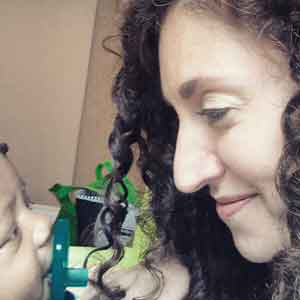
When Your Child Is In an Awkward Situation That Becomes Unsafe
Get kid-friendly activities sent to you!
Get the Best Kid-Friendly Activities
Sent to You Weekly!
So I approached them.
“Do you need a break?” I asked Gavri.
She didn’t quite answer.
So I asked in Hebrew, a language we both speak but I knew the other child would not understand, “Do you need help?”
She replied. “Maybe...kinda...yeah...”
I ended up having to remove the girl’s arm from around Gavri’s shoulders. When she walked away, Gavri started crying. She hadn’t really believed that anything bad would happen, but felt scared nonetheless. The girl had actually whispered threatening comments in her ear, but Gavri could tell the girl had delays and didn’t want to hurt her feelings by asking for help
“I realized afterward I should have asked you for help in Hebrew,” she said the next day. I pointed out that because she is regularly pushed outside her comfort zone, spending time with people who are different than she is, she is used to suppressing expressions of discomfort. But this crossed a line.
“There doesn’t have to be a ‘should have,’” I told her. “Now you know, going forward, sometimes your feelings have to be more important than someone else’s. It wasn’t so nice for me to speak to you in Hebrew in front of someone else (who wouldn’t understand), was it?”
Gavri nodded.
“It’s not my job to be nice. It’s my job to be your mommy.”
I know it’s the exposure Gavri has to people who make her feel uncomfortable and the fact that she placed greater emphasis on the other girl’s feelings than her own that caused Gavri to not ask for help outright or even to really advocate for herself. It really is important to us that our children learn to tolerate a little discomfort. I’m hoping, going forward, our children will feel confident and understand the distinction between “uncomfortable” and “unsafe.”
I’ve also made an effort to begin reminding my children that everybody’s feelings count—including theirs.
After this incident, my husband suggested that we establish a code or signal for them to use if they ever feel unsafe. Gavri seemed be given permission to ask for help. She was doubtful, however, that anything like this would ever happen again and that she would have the opportunity to use the code. “I would like to agree with you, Gavri,” I responded. “And I certainly hope that you never have to use it. But I think we’ve learned that it’s a good idea to have a code, and for you and your siblings to know that you’re allowed to use it without any concern for getting in trouble—even if you never use it.”
RELATED: Subscribe to our newsletter to read more stories like this.









